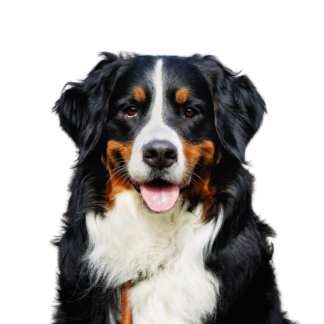Please create a free account below, or login by clicking here.
Petland Racine, Wisconsin

The Bernese Mountain Dog is one of four mountain-dog breeds who were long at home in the canton of Bern, a vast agricultural region vital to the dairy production required for two of Switzerland’s most profitable exports: chocolate and cheese. Even today, Bern’s website tells us, ‘Over 12,000 farms are spread over the canton’s valleys, hills, and mountain areas.’
Berners earned their keep by droving cattle, guarding farmyards from predators, and serving as gentle companions when the hard work of the day was done. Perhaps their greatest claim to working-dog fame is their ability to pull many times their own weight as drafting dogs, with their broad and muscular hindquarters generating immense strength.
Despite the breed’s great utility in the days before mechanized farming and ranching, by the late 1800s the Berner’s numbers were dwindling and the quality of the surviving dogs left something to be desired. A painstaking effort was begun by Swiss fanciers to reverse the breed’s decline.
In 1907, a Swiss breed club was formed under the leadership of Professor Albert Heim, perhaps the most respected European dog man of his generation. Before long, Berners were once again a favored farm dog, and they also caught on as companions with Swiss householders.
The breed’s American history began in 1926, when a Kansas farmer imported a pair as all-around farm dogs. They caught on quickly, and the AKC registered its first Berner in 1937. Today, the Bernese Mountain Dog Club of America sponsors drafting and carting events that test the working ability of these majestic mountaineers.
Berners are very intelligent, loving, and affectionate dogs. They love being part of a family and thrive when they are included in all fun family activities. Although berners are quite protective of their territories, they are not overly aggressive with strangers.
Instead, they tend to be withdrawn and a little shy around many people. It is therefore important that owners expose their dogs to different people and animals in the early stages of their lives to make them comfortable with new faces.
Socialization is very important to the overall health of every dog and with berners, the earlier they are trained in this aspect, the more well-rounded they become as adult dogs.
Bernese Mountain Dogs need at least a half-hour of moderate exercise every day to stay healthy and happy. While they are definitely meant to live indoors with their human family, Berners enjoy outdoor activities and make great companions on long walks or hikes. Outdoorsy owners often take their canine companions camping and backpacking. Berners enjoy pulling young children in a cart, and some even participate in carting and drafting competitions. Other canine sports in which Berners participate and excel include agility, herding, obedience, rally, and tracking..
The Bernese Mountain Dog has a double coat, with a longer outer coat and a wooly undercoat. Berners shed a fair amount, even more so during shedding season, which occurs twice a year. Weekly brushing’daily during shedding season’will help to remove loose hair and keep the dog looking his best. Any tangles can be worked out with a slicker brush or metal comb. As with all breeds, the nails should be trimmed regularly, as overly long nails can cause the dog pain and structural problems.
Early socialization and obedience training are important for all dogs, but especially so for breeds as large as the Bernese Mountain Dog. Berners are intelligent and eager to please, so they are usually easy to train. They are also affectionate and openhearted; their feelings are easily hurt, and so they don’t respond well to harsh corrections or training methods. A Berner wants to be with his family, and undesirable behaviors can result if he is regularly left alone for long periods of time.
Bernese Mountain Dogs need at least a half-hour of moderate exercise every day to stay healthy and happy. While they are definitely meant to live indoors with their human family, Berners enjoy outdoor activities and make great companions on long walks or hikes. Outdoorsy owners often take their canine companions camping and backpacking. Berners enjoy pulling young children in a cart, and some even participate in carting and drafting competitions. Other canine sports in which Berners participate and excel include agility, herding, obedience, rally, and tracking.
The Bernese mountain dogs were bred as watchdogs. They have the natural instinct to protect and care for their owners. This is why they will constantly place their paws on you and want to get into bed with you.
The Bernese Mountain Dog has a double coat, with a longer outer coat and a wooly undercoat. Berners shed a fair amount, even more so during shedding season, which occurs twice a year. Weekly brushing, daily during shedding season, will help to remove loose hair and keep the dog looking his best. Any tangles can be worked out with a slicker brush or metal comb. As with all breeds, the nails should be trimmed regularly, as overly long nails can cause the dog pain and structural problems.
The Bernese Mountain dog is one of the calmest and quiet dog breeds in existence. They are nurturing, caring and although they can be protective, they do not mark their territory in an aggressive way.
Berners have an average lifespan of 7-10 years.
Berners are more obedient than smart. They are eager to learn and please their masters and will do whatever is asked of them. This means they are quite easy to train and with consistent mental exercises, can become quite intelligent.
Berners have a lot of energy and can be very playful especially in the early ages.
Male Berners weigh about 80-115 pound while their female counterpart weighs about 70-95 pounds.
Fill out the below form and we'll get back to you as soon as possible. Thanks!
"*" indicates required fields